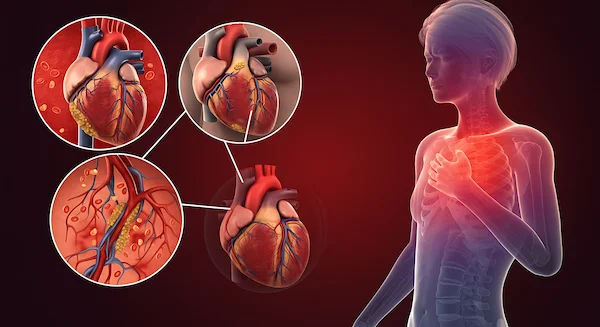Heart Block: Overview of Symptoms and Treatment
Learn about Heart Block, its symptoms, causes, and treatment options. Understand how this condition affects heart rhythm, available management approaches, and when to seek medical care.

Written by Dr. Rohinipriyanka Pondugula
Reviewed by Dr. Md Yusuf Shareef MBBS
Last updated on 13th Jan, 2026

Introduction
Heart block is a condition that affects the electrical system of the heart, causing an irregular or slow heartbeat. If you or a loved one has been diagnosed with heart block, you may have questions about what it means, how it affects your health, and what treatment options are available. This article will help you understand heart block in simple terms, its symptoms, causes, and ways to manage it effectively.
What Is Heart Block?
Your heart beats in a regular rhythm due to electrical signals that travel from the upper chambers (atria) to the lower chambers (ventricles). In heart block, these electrical signals are delayed or completely blocked, leading to an abnormal heartbeat.
There are three types of heart block:
1. First-degree heart block – The mildest form, where electrical signals slow down but still reach the ventricles.
2. Second-degree heart block – Some signals do not reach the ventricles, causing skipped beats.
3. Third-degree (complete) heart block – The most severe type, where no signals pass from the atria to the ventricles, leading to a dangerously slow heart rate.
Consult a Cardiologist for the best advice
Common Symptoms of Heart Block
Symptoms depend on the type and severity of the condition. Some people with first-degree heart block may not notice any symptoms, while others with more severe forms may experience:
Dizziness or lightheadedness
Fatigue and weakness
Shortness of breath
Fainting (syncope)
Chest pain (in severe cases)
Slow or irregular heartbeat (palpitations)
If you experience frequent dizziness, fainting, or chest pain, seek medical attention immediately, as these could indicate a serious heart condition.
What Causes Heart Block?
Heart block can develop due to various reasons, including:
Ageing – The heart’s electrical system may weaken over time.
Heart disease – Conditions like coronary artery disease or heart attacks can damage the heart’s electrical pathways.
Congenital defects – Some people are born with heart block.
Medications – Certain drugs (like beta-blockers or calcium channel blockers) can slow heart signals.
Infections or inflammation – Conditions like Lyme disease or myocarditis can affect heart function.
How Is Heart Block Diagnosed?
If your doctor suspects heart block, they may recommend:
Electrocardiogram (ECG/EKG) – Records the heart’s electrical activity.
Holter monitor – A portable ECG device worn for 24-48 hours to track heart rhythms.
Event monitor – Used for longer-term monitoring if symptoms are infrequent.
Echocardiogram – An ultrasound of the heart to check for structural problems.
Treatment Options for Heart Block
Treatment depends on the type and severity of heart block:
1. First-degree heart block – Often requires no treatment but regular monitoring.
2. Second-degree heart block – Some cases may need a pacemaker if symptoms are severe.
3. Third-degree heart block – Almost always requires a pacemaker to regulate the heartbeat.
Lifestyle Changes to Support Heart Health
Even if you have a mild form of heart block, adopting a heart-healthy lifestyle can help:
Eat a balanced diet – Focus on fruits, vegetables, whole grains, lean proteins, and healthy fats.
Exercise regularly – Moderate activities like walking, swimming, or yoga can improve heart function.
Avoid smoking and limit alcohol – Both can worsen heart conditions.
Manage stress – Practice relaxation techniques like deep breathing or meditation.
Monitor medications – Some drugs can affect heart rhythm, so always consult your doctor before taking new medications.
When to See a Doctor?
If you experience:
Frequent dizziness or fainting
Severe fatigue
Chest pain or shortness of breath
A very slow or irregular heartbeat
It’s important to consult a cardiologist for proper evaluation and treatment.
Final Thoughts
Heart block can range from mild to severe, but with proper diagnosis and treatment, most people can lead a normal, healthy life. If you notice any unusual symptoms, don’t ignore them; early detection and management are key to maintaining good heart health.
Consult a Cardiologist for the best advice
Consult a Cardiologist for the best advice

Dr. Tripti Deb
Cardiologist
40 Years • MBBS, MD, DM, FACC, FESC
Hyderabad
Apollo Hospitals Jubilee Hills, Hyderabad

Dr. Sumanjita Bora
Cardiologist
9 Years • MBBS, PGDCC
Bengaluru
Apollo Clinic, Sarjapur Road, Bengaluru

Dr. Shilpa Jayaprakash
Cardiologist
12 Years • MBBS, MD General Medicine, DM Cardiology
Bengaluru
Apollo Clinic, JP nagar, Bengaluru

Dr. Anand Ravi
General Physician
2 Years • MBBS
Bengaluru
PRESTIGE SHANTHINIKETAN - SOCIETY CLINIC, Bengaluru

Dr. Bhethala Sharan Prakash
General Physician/ Internal Medicine Specialist
5 Years • MBBS MD
Bengaluru
PRESTIGE SHANTHINIKETAN - SOCIETY CLINIC, Bengaluru


